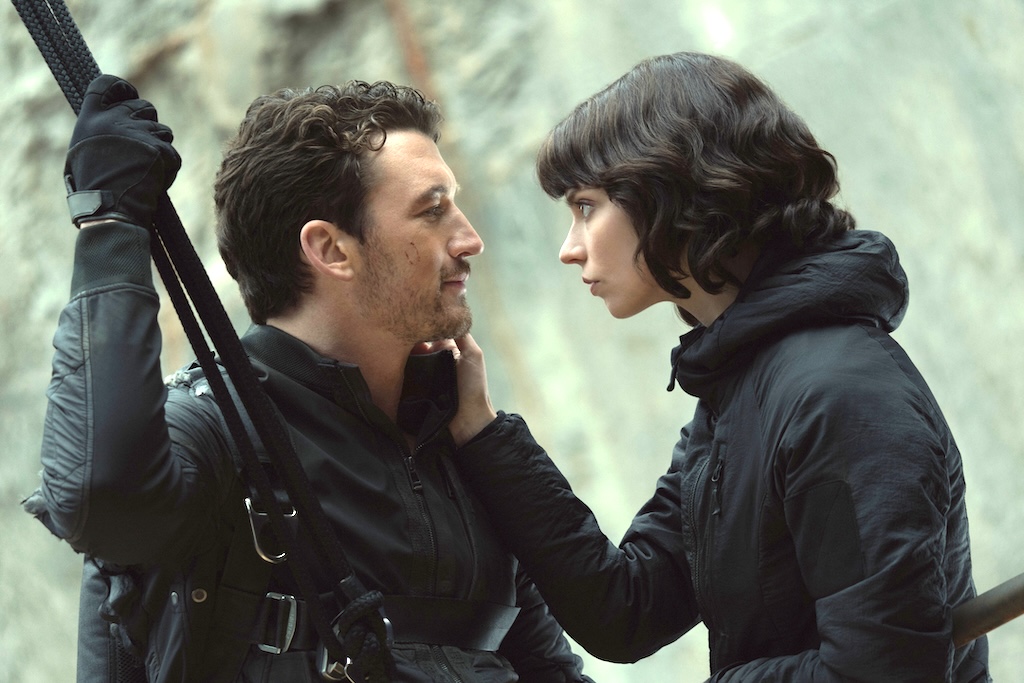The Gorge written by Zach Dean (Tomorrow War) and directed by Scott Derrickson (The Exorcism of Emily Rose) is a mixed bag of romance, sci-fi, fantasy, action, thriller, horror that asks, “What would the doorway to hell look like?”
There’s a chasm (the gorge) and cement guard towers on either side. The West is manned by Americans (Miles Teller) and the East by a Russian (Anya Taylor-Joy). Expert snipers with no ties to others; their mission is to prevent whatever is in the gorge from coming out.
Mystery
What I thought was most effective in the storyline was the mystery of what was going on in the gorge. Levi Kane (Miles Teller) is told by J.D. (Sope Dirisu) some of the rules, but the whole situation is as foggy as the mist that rises from the gorge.
This carries a lot of the beginning setup. We’re interested and can’t stop asking questions. Add in the natural curiosity of putting two attractive people on stage and we can’t wait to find out how that’s going to unroll, even if we know there’s certain inevitabilities. Highly effective storytelling.
Plus, there’s this constant undercurrent of genre violence. The weapons are big and nasty so the critters, whatever they are, will be too.
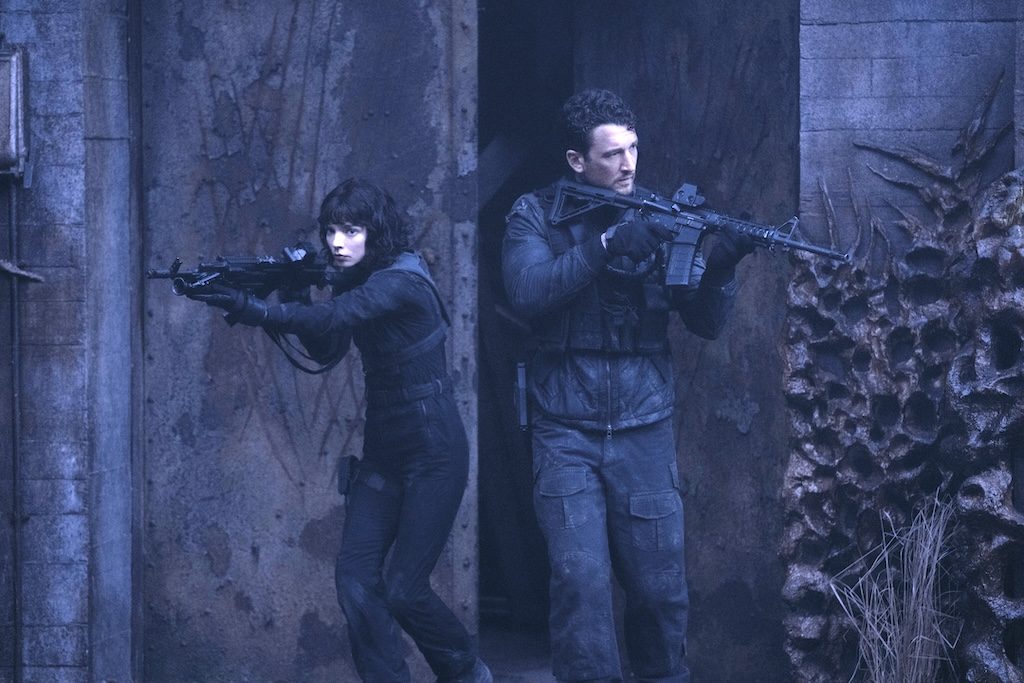
Drasa (Anya Taylor-Joy) & Levi (Miles Teller) Photo courtesy of Apple TV+
A-Story/ B-Story
I always tell students to include a love story when possible. It gives you places to go in the narrative thread and compels a nice level of audience interest. The plot is one thing, the romance another. And rather than being a mixed-bag in The Gorge as I’ve seen mentioned, both stories are necessary and complete the story line.
Levi and Drasa (Anya Taylor-Joy) are a refreshing change of pace in an actioneer; and that bond as equals, back-to-back fighting partners, is made even stronger by their burgeoning love. They fight for each other like the demons that are chasing them and you never don’t believe it.
When Levi falls into the gorge, Drasa doesn’t hesitate to dive in after him. Her logic isn’t at play here; her emotions are, and I never doubted she’d try to save him.
The love story is essential to the entire film. And it forms the basis of a nice ending.
The Rules
All stories have rules. Setting them up is the best way to create suspense. If magic/ supernatural/ alien powers can do anything then there’s no suspense. Plus, we need limits to understand how hard it will be to succeed.
J.D. gives Levi the run down as soon as Levi arrives.
Bullet points from the script:
- You are completely isolated and self-sufficient.
- That is East Tower. Contact with the other side is strictly forbidden.
- Land mines and lethal tactical barriers are to the north and south of the Gorge.
- There are automatic Phalanx gun turrets every 600 meters or so. You restock the ammo in the auto guns, check the containment fence, cloakers, and suspended mines.
- Straydog protocol, etc.
Much of this information is necessary for the story to proceed now and some later. It’s a lot, but it’s delivered in an easy-to-digest way. The rules give us a way to gauge what’s coming. It sets boundaries and creates moments where we know danger is lurking. It also establishes the stakes.
Whatever is in the gorge, there’s enough armament to stop an army – and once the action starts popping off (the first invasion) we understand why.
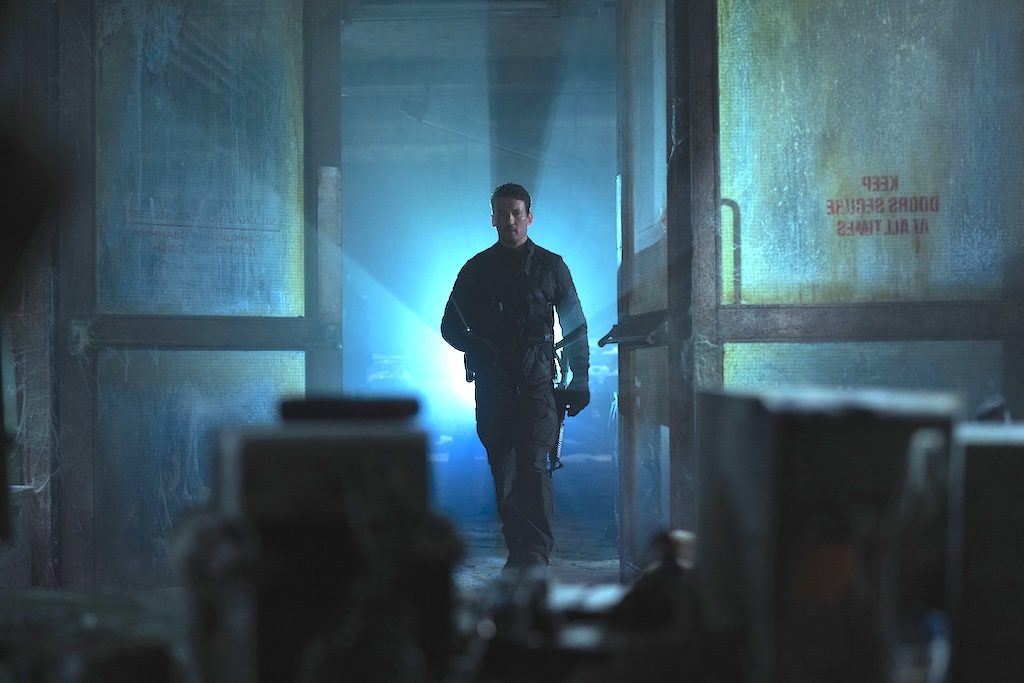
Suspension Of Disbelief
I’ve seen this written as suspension of belief. Not so. The phrase means we set aside our disbelief to enjoy the movie/ show. Do we really accept flying monkeys? Wicked witches? And an entire town of munchkins? Yes, because we’re in Oz, over the rainbow, where things are not like our world.
In similar fashion The Gorge is a world unto itself. We suspend our logic and what we know to go there. The writer’s job is to make the unbelievable believable, or at least acceptable. Some of what we’re meant to embrace is right up front, and some comes later by way of explanation of what’s really behind the existence of the gorge.
Moderated Info Dumps
Perhaps the hardest part of any sci-fi story is explaining it. The Gorge is effective in that, as mentioned, in that we get info as needed. After the initial briefing by J.D. Levi doesn’t get much more in the way of what the gorge is until he falls into it. Then, with Drasa, he explores the inside of the gorge and we’re enlightened as to what has happened to create this situation.
Before this, we know a little, have seen a little of the creatures, but nothing like when inside the gorge. Info dumping and visuals are important to get just right. New writers have a tendency to create long, static scenes and shove all the information into it. There’s about a thousand more interesting places to give info than a restaurant, and yet writers consistently put scenes in restaurants and coffee shops.
For any of its faults, The Gorge has extremely interesting backdrops for any info scenes.
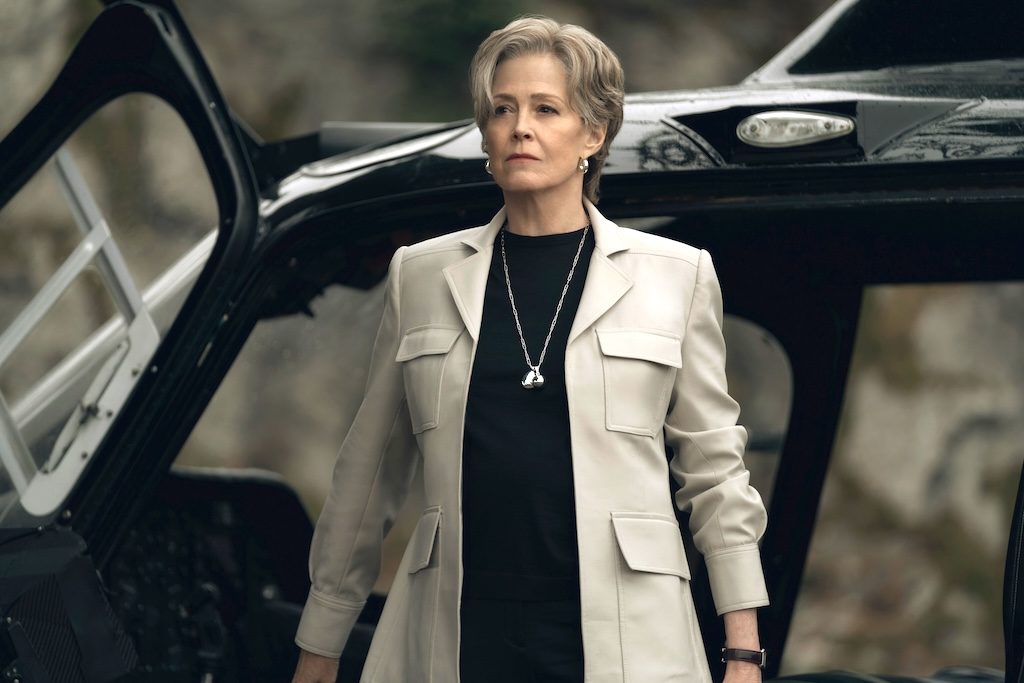
Bartholomew (Sigourney Weaver) Photo courtesy of Apple TV+
Set Pieces/ Unique Moments
The Gorge fully utilizes the uniqueness of its situation and story. There are moments here that I’ve never seen before and probably won’t see again. A sharpshooting contest involving bottles of booze across a chasm, going on a date via zipline and eating rabbit stew, and climbing a mountain using the winch on a Jeep.
Enough moments to keep the story fresh and interesting.
Split Personality
Yes, the movie is a romance and a sci-fi actioner/thriller combo. Many point out the unevenness of this approach to mashup storytelling, but as mentioned, it works to make the story stronger.
I’d call it a mashup – like Linkin Park/Chainsmokers w/Halsey. It feels like it shouldn’t work, but it does. And it’s not all one or the other. Each scene honors a specific genre.
Don’t dismiss the enduring tension of the unknown in the first half of the movie with hints of terrible things to come dropped throughout. Screams are heard coming from the gorge. Things are creeping on the walls in the shadows, and at 36 minutes those walls are attacked by multitudes of creatures.
Lots of suspense and action to play out with the nascent romance. Then, once Levi and Drasa are in the gorge, plenty of action, but also suspense and romance as the perfectly paired duo work to save each other. Will they survive?
The action escalates to intense levels. but there was always the anticipation of that action happening even when they were falling in love. It all adds to the tension because we now don’t want them to die just as they’ve found each other.
Not So Odd Couple
Two snipers walk into a gorge as the joke may go. One is Russian, playful, and beautiful, and the other is rugged, stoic, and a poet? Yes, well, since the film’s themes are taken from a T.S. Elliot poem, The Hollow Men, regarding the tolls combat takes. It’s also illustrative to what’s in that gorge and the price warriors pay for war. These are broken characters because of duty to their respective countries.
Having them share some things (dealing death, world-class sniper skills) but not having things in common (his poetry, her (mostly) lightness of being) allows for great touchpoints where they can form a dynamic relationship in a hurry. They bond over the toll of their occupations and learn from each other other things that delight them. She makes him rabbit stew and he tells her about his poetry. They comfort each other about the nightmares they have. Great ways to create a relationship quickly that’s believable. I wonder what their tinder profiles might look like?
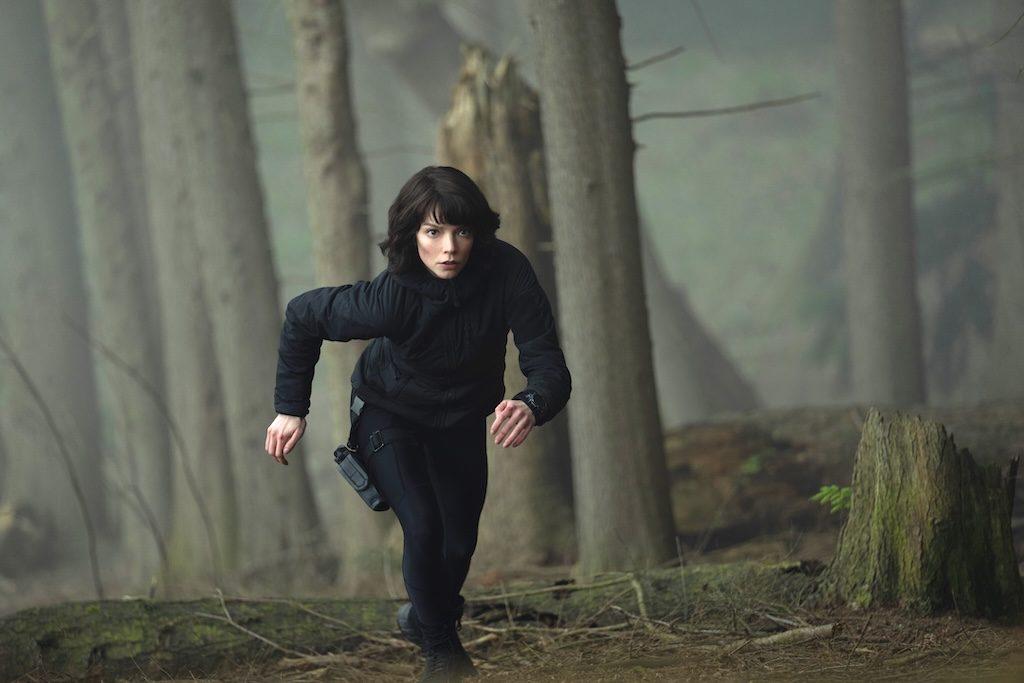
Villains
Beside the creatures who live in the gorge, Sigourney Weaver plays Bartholomew, a tough woman in charge of a covert group. Of course, Weaver is well known as being a badass as Ripley from the Alien franchise and she makes us believe that another badass, namely Drasa, can kick butt and take names in similar fashion.
The hollow men are also incredibly dangerous and play their role in the action, but it’s Bartholomew to be afraid of. She shakes your hand with a knife in the other. This is nicely set up when the previous guardian, J.D., is dropped from a helicopter to his death on her orders.
Sprinkle in some internalized demons and you’ve got solid CGI villains on all fronts. Well-designed to serve their purposes.
Themes
As already mentioned, there’s isolation, commercial greed, love, betrayal, situational morality – lots to unpack. The strongest theme is finding love when and where you never thought you would. But the idea of so-called justified assassination is strong and hangs over these two like nothing else. The writer works hard to make Levi and Drasa at least understandable.
Drasa’s father Erikas (William Houston) talks to her at a cemetery about her last assignment.
ERIKAS
Moscow could not risk having a direct link
to the oligarch’s death.
DRASA
He had four children.
ERIKAS
The Belarusian (her last hit) made himself rich trading
in white phosphorus bombs and land mines.
How many children’s legs were lost?
How many little faces were forever burnt
by those transactions?
DRASA
It’s not so easy anymore. I don’t sleep.
Sometimes for days.
Levi has similar hesitations and so the two bond on a level that only they can understand. Love conquers all, even with assassins.
Inevitable Not Predictable
Both the A-story and B-story are eminently satisfied by their endings.
The gorge and Bartholomew are nuked and Drasa escapes. At that point, we’re not sure Levi makes it out, but the deliberately ambiguous setup to this sequence implies he did.
When the epilogue cuts to Drasa as a waitress in France (at a place she and Levi had talked about before) there’s Levi with a sign that says, “I’ll take the rabbit stew.” They go moonie-eyed over each other and the love (emotional) story is satisfied – everyone lives happily. Connection and redemption, where at the beginning of the movie, none was possible.
[More: Scott Derrickson Reveals The Dire Secret Of “The Gorge”]
